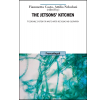The Jetsons' Kitchen. A zero-mile system for waste water recycling and cultivation
Synopsis
Pubblicato con licenza Creative Commons Attribuzione-Non Commerciale-Non opere derivate 4.0 Internazionale (CC-BY-NC-ND 4.0) nella collana Uomo, ambiente, sviluppo
The book aims to investigate the up-cycling of domestic effluents for plant production, bringing together a series of considerations by an interdisciplinary group of researchers from the Politecnico di Milano, Università Statale di Milano and Università di Roma Tor Vergata, ranging from biology to design through sociology and architectural composition.
Integrating vegetable cultivation in the domestic environment with reusing kitchen wastewater for irrigation is a promising strategy for reducing freshwater consumption, limiting the amount of wastewater to be treated producing healthy plant food and, ultimately, raising environmental awareness among citizens. A first step in this direction is the experimental project to reuse dishwasher effluents in living spaces (kitchen, household, and community level), as described in the book. Dishwasher effluents were chosen as an initial bench test because of their high nutrient content, low harmful elements and constant wastewater quantity and quality, where treatment may consist of a combination of several chemical, physical and biological processes. Studies for the development of a domestic biofilter containing a consortium of microalgae and heterotrophic bacteria are also presented.
Downloads


